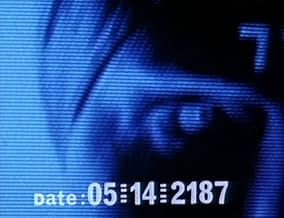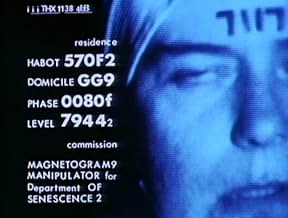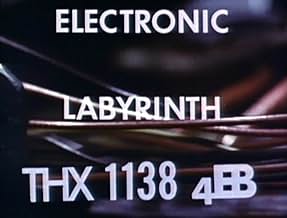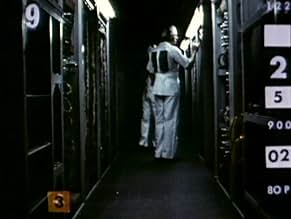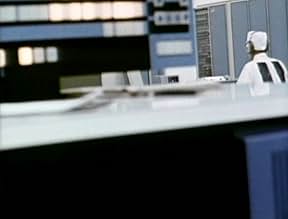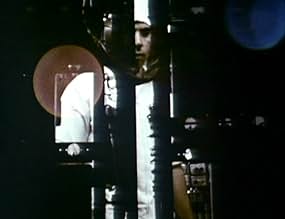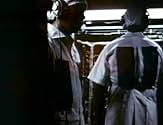Electronic Labyrinth THX 1138 4EB
- 1967
- 15 min
AVALIAÇÃO DA IMDb
6,2/10
2,8 mil
SUA AVALIAÇÃO
Adicionar um enredo no seu idiomaWhile monitored and pursued, a man races to escape through a futuristic labyrinth.While monitored and pursued, a man races to escape through a futuristic labyrinth.While monitored and pursued, a man races to escape through a futuristic labyrinth.
- Direção
- Roteiristas
- Artistas
- Prêmios
- 1 vitória no total
- Direção
- Roteiristas
- Elenco e equipe completos
- Produção, bilheteria e muito mais no IMDbPro
Avaliações em destaque
After seeing the theatrical THX 1138 and enjoying its feel very much, I was hyped to be able to see this student project. Let me say that, first and foremost, most of the shots in this film are of absolutely nothing happening. Shots of mainframe computers and other such gadgetry probably lent this film quite an alien feel in 1967, but now it merely fills time waiting for the plot to advance. For 15 minutes, you watch as the story of THX slowly unfolds, how he runs to escape his sterile surroundings and finally reaches his goal.
Probably the most remarkable thing I noticed about this movie is how things changed and how they stayed the same for Lucas in his later pictures. He still treats his actors like action figures. However, I noticed the utter lack of 'cute ideas' that spiced up even the theatrical release of this film. Very monochromatic in emotion and execution, but still gripping in a very real way.
Probably the most remarkable thing I noticed about this movie is how things changed and how they stayed the same for Lucas in his later pictures. He still treats his actors like action figures. However, I noticed the utter lack of 'cute ideas' that spiced up even the theatrical release of this film. Very monochromatic in emotion and execution, but still gripping in a very real way.
Electronic Labyrinth THX 1138 4EB (1967)
*** (out of 4)
This short film from writer-director George Lucas was certainly the most important one he ever made for a number of reasons. For one, it got some national attention, which also meant critics were aware of his name. For two, it led to him meeting Steven Spielberg and we know what happened from there. And thirdly, the film would eventually be turned into a feature.
The story is pretty simple as it takes place in a futuristic world where a man (Dan Natchsheim) is trying to escape but no matter where he runs someone is monitoring him.
As of me writing this, I actually haven't seen the feature so I have no idea of knowing what Lucas changed or whatever but for the most part this here was pretty interesting. I thought the highlight was clearly the visuals since Lucas didn't have too much money to work with yet you still got the impression that you were watching something set in the future. The "story" was a bit all over the map but I guess that was to be somewhat expected and I'm sure it was expanded for the feature.
*** (out of 4)
This short film from writer-director George Lucas was certainly the most important one he ever made for a number of reasons. For one, it got some national attention, which also meant critics were aware of his name. For two, it led to him meeting Steven Spielberg and we know what happened from there. And thirdly, the film would eventually be turned into a feature.
The story is pretty simple as it takes place in a futuristic world where a man (Dan Natchsheim) is trying to escape but no matter where he runs someone is monitoring him.
As of me writing this, I actually haven't seen the feature so I have no idea of knowing what Lucas changed or whatever but for the most part this here was pretty interesting. I thought the highlight was clearly the visuals since Lucas didn't have too much money to work with yet you still got the impression that you were watching something set in the future. The "story" was a bit all over the map but I guess that was to be somewhat expected and I'm sure it was expanded for the feature.
The film departments of UCLA and Southern California University had an annual film competition for students from both schools at a time when they and New York University were about the only schools in the country offering a degree in cinema. In 1967, I attended the showing at UCLA's Royce Hall, and George Lucas's THX-1138 was a standout work among many very good ones. Not only was it the audience's favorite, but the judges awarded it best picture. Lucas was called to the podium to accept his award. He seemed nervous and shy at the microphone, but then startled as he was interrupted at the microphone, apparently a surprise to all on stage, by a lawyer from Warner Brothers who announced that Warners was offering whoever won the competition the opportunity to turn it into a feature. That was of course George. It seemed an eternity while he stood speechless, mouth open. Warners already had the young Francis Ford Coppola under contract, so they assigned him as producer to George. I then saw the resulting feature "THX 1138" in 1971 at a theater in Hollywood. It was not great commercial success, but as we all know, the success of the George Lucas career is legendary.
This is found on the 2-Disc George Lucas Director's Cut release of THX 1138 that came out in 2004. His student film. You're probably more familiar with the remake that he made(and everyone who's watched any of his work may have seen the four numbers appear somewhere, and he used the prefix as the title of his sound-system). This and especially the theatrical version of '71 had an ambivalent effect on his career in the field; the studio had no idea how to sell the latter, and it led to the downfall of the original dream of what American Zoetrope was. It also proved that he could make something otherworldly and unique, and he might not have made Star Wars(or it could have been less than it was) if not. This is very experimental, and its visual side is compelling and interesting. The sound is creative(given the constraints), and editing is skillful. In 15 short minutes, this manages to convey many of the themes he would explore to a greater extent in the feature-length quite subtly and without anything feeling staged. The acting is satisfactory. There is a bit of disturbing content in this. I recommend it to any fan of cinema that takes chances. 7/10
Although very little happens in terms of action in George Lucas's best-remembered student film "Electronic Labyringth THX 1138 4EB", there is already plenty to be admired in the visual look alone, considering the assumed small budget they had to work with at the USC. As in all of Lucas's early shorts, the film is very well-made with lots of good craft on display: the locations and costumes, while not overly elaborate, give enough of an atmosphere to suggest an otherworldly environment. The editing is skillful as well, being an almost abstract mishmash of shots and snippets of audio which add to the intensity of the action a little, although it certainly doesn't possess the type of intensity Hollywood would make use of. That aside, the plot itself is rather skimpy and carries plenty of repetition in the images and soundtrack; to expect a greater narrative would be admittedly absurd for fifteen minutes, yet the fact that Lucas took even that long to convey what plot he had shifts the focus to the atmosphere and setting built into it, rather than specifically the plot.
The context of the story is rather unclear, although it is made more interesting simply because we are left to decipher what is happening. The film seems to be occurring in a Dystopian setting as the likes of George Orwell would come up with - a time when the higher powers have taken over, enslaving and ruling over those below them with an iron fist. In this version, the setting is an Electronic Labyrinth in a presumed future when technology has taken over to control the lives of others. The film follows a man, given the designated number 1138, as he attempts to do the unspeakable - escape the slavery of technology, running through shiny white hallways to make it out before he is destroyed by his oppressors. With consistent intercoms blaring instructions on how to stop him mixed with security cam footage and scenes of men in headsets pulling switches, the film's atmosphere is a unique one, repetitive yet oddly surreal, with enough creativity to the settings and costumes to make give it a futuristic feel. The unanswered questions are many, yet they add to the experience - so much so that I doubt I would benefit much if at all from seeing Lucas's 1971 feature film "THX 1138" which elaborates on things. Little plot definitely, yet enough to play with the viewer's mind while simultaneously giving clues through a well-built environment. Certainly remarkable for a student's work, technically and analytically speaking.
The context of the story is rather unclear, although it is made more interesting simply because we are left to decipher what is happening. The film seems to be occurring in a Dystopian setting as the likes of George Orwell would come up with - a time when the higher powers have taken over, enslaving and ruling over those below them with an iron fist. In this version, the setting is an Electronic Labyrinth in a presumed future when technology has taken over to control the lives of others. The film follows a man, given the designated number 1138, as he attempts to do the unspeakable - escape the slavery of technology, running through shiny white hallways to make it out before he is destroyed by his oppressors. With consistent intercoms blaring instructions on how to stop him mixed with security cam footage and scenes of men in headsets pulling switches, the film's atmosphere is a unique one, repetitive yet oddly surreal, with enough creativity to the settings and costumes to make give it a futuristic feel. The unanswered questions are many, yet they add to the experience - so much so that I doubt I would benefit much if at all from seeing Lucas's 1971 feature film "THX 1138" which elaborates on things. Little plot definitely, yet enough to play with the viewer's mind while simultaneously giving clues through a well-built environment. Certainly remarkable for a student's work, technically and analytically speaking.
Você sabia?
- CuriosidadesThe "EB" referred to in the title means "earth born" according to the original script writer.
- Erros de gravaçãoDuring the credits where George Lucas is mentioned as the director, a piece of transparent tape is visible on the left side of the screen.
- ConexõesFeatured in Omnibus: George Lucas - Flying Solo (1997)
Principais escolhas
Faça login para avaliar e ver a lista de recomendações personalizadas
Detalhes
- Data de lançamento
- País de origem
- Idioma
- Também conhecido como
- THX 1138 4EB
- Locações de filme
- Empresa de produção
- Consulte mais créditos da empresa na IMDbPro
Contribua para esta página
Sugerir uma alteração ou adicionar conteúdo ausente

Principal brecha
By what name was Electronic Labyrinth THX 1138 4EB (1967) officially released in India in English?
Responda
